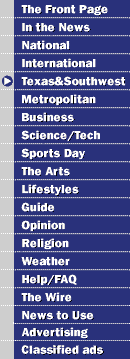|
10/02/93
Report on FBI actions in raid on cult delayed
By Lee Hancock / The Dallas Morning News
WASHINGTON - A review of FBI actions in the Branch Davidian siege - which reportedly clears senior bureau officials while criticizing decisions of low- and mid-level agents - has been delayed by federal prosecutors' objections that it could hurt the government's case against members of the sect, federal officials said Friday.
The New York Times , citing knowledgeable federal sources, reported Saturday that the Justice Department's review will criticize mid- and lower-level FBI agents who recommended that negotiations be ended in favor of a tear gas assault. But it clears their superiors and Attorney General Janet Reno, even though Ms. Reno, relying on the senior FBI officials' recommendation that it was the only viable option approved the assault, The Times reported.
Branch Davidian leader David Koresh and more than 80 of his followers died April 19 in a fire that federal authorities say was deliberately set hours after FBI agents began ramming the sect's heavily fortified compound with tanks and injecting tear gas.
The FBI was brought in to manage the siege on March 1, the day after Bureau of Alcohol, Tobacco and Firearms agents met with a bloody ambush after trying to serve search and arrest warrants on the sect. Four ATF agents and several cultists died and 20 agents were wounded in the Feb. 28 firefight.
The Justice Department report was scheduled to be released Tuesday, but department spokesman Carl Stern said it has been postponed and no new release date has been set.
He said the report is still being completed but declined further comment on reasons for the delay.
But federal sources told The Dallas Morning News that the delay was largely due to prosecutors' deep concerns that detailed evidence included in a lengthy siege chronology prepared by the FBI includes sensitive wiretap information and other evidence crucial to their case against 11 surviving Branch Davidians.
Former Watergate prosecutor Henry Ruth, who assisted in a U.S. Treasury probe of ATF's actions released Thursday, said that even prior to the most recent delay, internal debate had forced Justice officials to cancel plans to release their review in tandem with Treasury's report.
One federal official said prosecutors have protested that inclusion of detailed evidence in the Justice report could affect defendants' ability to get a fair trial, and depending on how much is made public in Washington, could give defense lawyers "things they could never get through normal discovery."
The FBI chronology contains transcripts of negotiations with cult leader David Koresh, conversations picked up by bugging devices slipped into the compound during the 51-day seige, and other evidence that could prove key to the trial, federal sources say. In effect, some officials say, the chronology appears focused on reciting the misdeeds of Mr. Koresh and his followers over the course of the siege.
Federal prosecutors could not be reached for comment Friday.
Justice Department officials have countered that the report should include as much information as possible to show exactly what happened during the protracted standoff with the Waco cult, sources said.
But others in federal law enforcement say priority should be given to the prosecution of 11 Branch Davidians accused of conspiracy in the deaths of four Bureau of Alcohol, Tobacco and Firearms agents in the failed Feb. 28 raid.
"Since there will be a trial where evidence will be presented against the Branch Davidians, why such emphasis on making a case against the Branch Davidians in this report?" said one official. "One effect of releasing that information in the Justice review will be to draw all media attention away from the performance of the FBI and onto the revelations about Branch Davidians." A Treasury Department review released Thursday criticized the ATF action for poor planning, flawed intelligence, and a fatal decision to execute the raid even after commanders learned that its secrecy had been compromised.
The raid's two Houston-based commanders and three other ATF senior officials were placed on adminstrative leave Thursday after the Treasury review determined that they had covered up reasons for the raid's failure by lying to investigators, the public or officials in Washington.
Some Treasury officials have said they fear the Justice Department's review of the FBI will be far less comprehensive than the Treasury study and may try to lay ultimate blame for the disaster on ATF's mishandling of the initial raid.
"They may be saying that they were left with an unstable situation, but the responsibility of the (FBI) hostage rescue team is to take over unstable situations," one official said. "And when they came in, the situation had become stable. People were being let out, there were negotiations and there was no shooting going on."
The officials also have noted that the FBI was allowed to participate in the Justice investigation, questioning the witnesses interviewed in the inquiry and preparing the account of the siege being used to analyze its commanders and agents' performance.
On Thursday, one of Treasury's independent reviewers made a point of voicing those concerns when the Treasury report was released.
"I just hope that the Justice study will be as thorough as ours," Mr. Ruth told reporters.
He said Friday, "Sure I'm concerned. I'd be concerned about any internal involvement in an investigation of an event of this magnitude, particularly with the FBI having three instances which ended in a fire which consumed human beings. For public confidence, you'd want an outside investigation."
He was referring to three FBI confrontations. A 1974 gunbattle pitting FBI agents and Los Angeles police against members of the Symbionese Liberation Army ended in a fire that killed every occupant of an SLA house. In 1983, tax protester Gordon Kahl, wanted for killing two U.S. marshals, died in a fire that erupted during a shootout after FBi agents tracked him to a farmhouse in Arkansas.
And, in 1984, Robert Matthews, leader of a group of white supremacists who robbed banks and assasinated a Denver talk show host, was killed in a fire after after a two day standoff with the FBI on Whidbey Island in Washington state.
Mr. Stern, the Justice spokesman, said however, that Justice lawyers assisting Edward S.G. Dennis Jr., a former Justice official asked to prepare a review of FBI's actions for the Justice report, have ensured a thorough inquiry. And he added that the FBI agents involved were "totally under the supervision of Justice."
The review has not only been delayed by complaints from prosecutors but also has faced complaints from at least one of 13 experts asked to provide recommendations and analysis of how to avoid future standoffs like the Branch Davidian siege.
Dr. Alan A. Stone, professor of law and psychiatry at Harvard University, said he is delaying his report until the Justice review is completed because he did not believe he could make informed assessments with information provided to reviewers prior to its completion. "I decided I cannot not give recommendations about the future without a clear understanding of what happened in Waco," he said.
A Justice spokesman said earlier this month that Dr. Stone was delaying his report because he had fallen behind other reviewers after missing briefings while he was traveling overseas but another Justice official acknowledged to The Times Friday that the professor wanted a complete factual report before making conclusions.
Dr. Robert Cancro, who assisted in analyzing FBI handling of behavioral science issues during the siege, said his individual assessment will reflect criticism that the agency confused cultists with "using the carrot and stick technique simultaneously. They were trying to talk them out and also showed force. That may not have been wise."
Dr. Cancro, chairman of New York University Medical Center's psychiatry department, was one of 13 outside experts assisting in the review and preparing individual reports about ways to avoid such standoffs in the future.
Although he concluded that the FBI faced enormous public pressure to do something to end the siege and was hobbled by the mess left by ATF, Dr. Cancro said, "the introduction of gas left a lot to be desired. I think a number of us had the feeling that it had not been thought though adequately."
And using tanks to insert the gas, ramming huge holes and knocking down the compound's outer walls, while telling Branch Davidians that they were not being assaulted and should come out sent "a double message."
"I think it's a technique that probably would have worked better if they had been bankrobbers holding hostages," he said. "But these were not hostages. They were there because they wanted to be. I think the real issue is in the future, American law enforcement is likely to face many more such situations because of what we see happening in militant Islam and other religious groups."
He added that FBI agents also sent a confusing message by using lights and loud music around the compound, "cutting the electricity, tightening the perimeter. I don't think that was the message you wanted to get across. I think it would've been a lot better for someone with a theological background to go in and talk to this guy."
Another reviewer who declined to be named said FBI commanders in Waco ignored dire warnings of their own behavioral science experts that Mr. Koresh posed a significant suicide risk.
That contradicts statements by senior FBI officials and Ms. Reno after the April 19 fire that their behavioral science advisers did not see suicide as a real threat.
|


![]()



